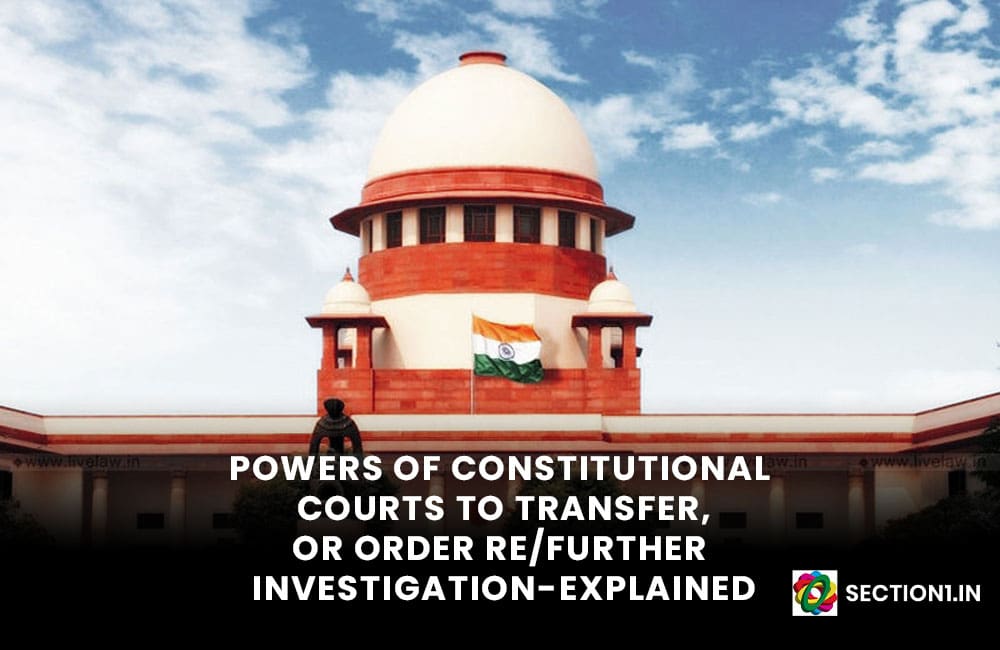7.1 Therefore, the short question, which is posed for the consideration of this Court is:
“Whether in the facts and circumstances of the case, the High Court is justified in denying the relief of transfer of the investigation to CBI and refusing to order further investigation / re-investigation / de novo investigation?”
7.2 While considering the aforesaid issue and appreciating the above submissions made on behalf of the respective parties, few decisions of this Court on the power of the Courts to transfer the investigation to another agency like CBI and the powers of the constitutional courts to order further investigation / re-investigation / de novo investigation are required to be referred to. [Himanshu Kumar and Ors. Vs. State of Chhattisgarh and Ors., 2022 SCC Online SC 884 (para 44 onwards)].
xxx
7.4 Bearing in mind the position of law as discussed above and, in the facts, and circumstances of the case, we are of the opinion that the High Court has not committed any error in refusing to transfer the investigation to CBI. Even the learned counsel appearing on behalf of the appellant has not vehemently pressed such a prayer. We are in complete agreement with the view taken by the High Court insofar as refusing to transfer the investigation to CBI is concerned.
8. Now, so far as the power of the Constitutional Courts to order further investigation / re-investigation / de novo investigation even after the charge-sheet is filed and charges are framed is concerned, the following decisions are required to be referred to:-
Bharati Tamang Vs. Union of India and Ors., (2013) 15 SCC 578; Babubhai Vs. State of Gujarat, (2010) 12 SCC 254 (paras 40 and 42); Ram Jethmalani Vs. Union of India (2011) 8 SCC 1; Dharam Pal Vs. State of Haryana and Ors., (2016) 4 SCC 160 (para 25);
9. Now, so far as the reliance placed upon the decision of this Court in the case of Vinubhai Haribhai Malviya and Ors. Vs. State of Gujarat and Anr., (2019) 17 SCC 1 (para 42),relied upon on behalf of the respondent – accused is concerned, it is required to be noted that in the said decision, this Court was considering the powers of the Magistrate. Even in the said decision, it is observed and held that there is no good reason given by the Court as to why a Magistrate’s powers to order further investigation would suddenly cease upon process being issued. It is further observed that power of the police to further investigate the offence continues right till the stage the trial commences. It is further observed that Article 21 of the Constitution demands no less than a fair and just investigation.
10. Now, so far as the reliance placed upon the decision of this Court in the case of Rama Chaudhary (supra) relied upon on behalf of the respondent – accused is concerned, it is required to be noted that in the said decision, this Court was considering the scope of Sections 173(8) and 173(8)(2) Cr.P.C. and the right of the police to “further investigation”. It is observed that the police has no right for “fresh investigation” or “reinvestigation”. However, this Court had no occasion to consider the powers of the constitutional courts , which are dealt with and considered in the case of Bharati Tamang (supra) and Dharam Pal (supra).
11. Applying the law laid down by this Court in the case of Dharam Pal (supra) and Bharati Tamang (supra) and to do the complete justice and in furtherance of fair investigation and fair trial, the constitutional courts may order further investigation / re-investigation / de novo investigation even after the charge sheet is filed and the charges are framed. If the submission on behalf of the accused and even as observed by the High Court that once the chargesheet is filed and the charges are framed, there may not be any order for further investigation / re-investigation / de novo investigation is accepted, in that case, the accused may see to it that the charges are framed to avoid any fair investigation / fair trial. It would lead to travesty of justice.
xxx
12.3 Be that as it may, even according to the State investigating agency, the further investigation is required. As observed and held by this Court in the aforesaid decisions, the victim has a fundamental right of fair investigation and fair trial. Therefore, mere filing of the charge-sheet and framing of the charges cannot be an impediment in ordering further investigation / re-investigation / de novo investigation, if the facts so warrant.
PARTY: Anant Thanur Karmuse Vs. The State Of Maharashtra & Ors – Criminal Appeal No. 13 Of 2023 – February 24, 2023.
URL:Download
Files : Download





